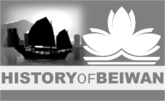Qǐyì Revolution
| Qǐyì Revolution | |||||||
|---|---|---|---|---|---|---|---|
| |||||||
| Belligerents | |||||||
|
Support from |
| ||||||
| Commanders and leaders | |||||||
|
|
| ||||||
| Strength | |||||||
| 24 | 18 | ||||||
| This article is part of a series on the |
| History of Beiwan |
|---|
 |
| Timeline |
The Qǐyì Revolution took place between July and August 2014 in the areas surrounding Beiwan, and was fought between forces of the Empire of Chukou and the Ying dynasty led by Liu-kuang.
Liu-kuang led his army to attack Chukou's capital Gonghai from two directions (South and West). The Empire of Chukou's Prime Minister Wong Yung-jie ordered the Imperial Chukouese forces defending Gonghai to open the gates and let Ying Army in. After the fall of the Empire of Chukou, Wong Bao-kong was captured, arrested and forced in "quick trail". During trail, the future emperor Liu-kuang did not give a tantō for Wong to commit Seppuku, he said "I am much more discipline than Mr Wong and I will not betray any principles of the Chinese folk religion, former dictator Wong Bao-kong will live in exile, living in guilt is the worse punishment than death.". No actual battle was fought in Beiwan itself because the Ying Army marched on the capital unopposed, and even after occupying Chukou's capital, the army did not face any resistance. Liu-kuang then acceded to the throne, and established the Greater Beiwanese Empire as emperor.
This article has not been added to any content categories. Please help out by adding categories to it so that it can be listed with similar articles. (July 2023) |